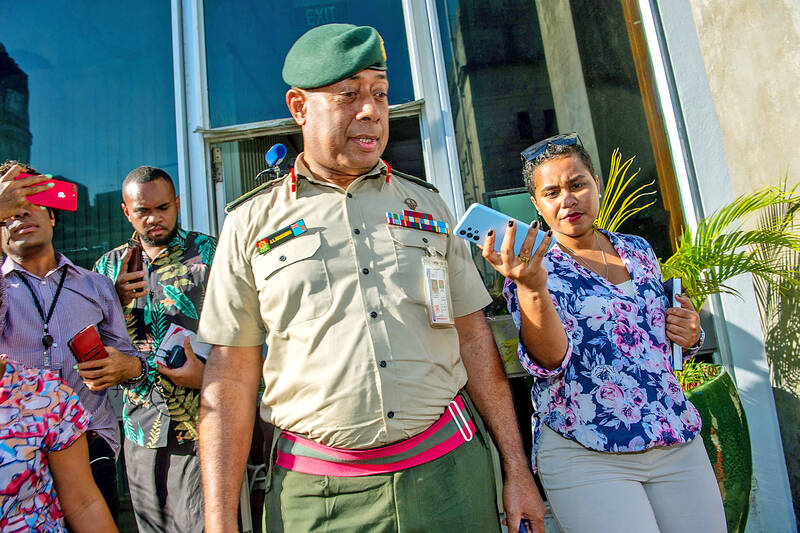Fiji’s military chief yesterday warned that reforms under Fijian Prime Minister Sitiveni Rabuka might contravene the constitution, but also pledged to respect the law and “stand with democracy.”
Fiji has had four coups in the past 35 years and the possibility of military intervention loomed over a tight general election last month.
Rabuka’s victory ended the 16-year rule of former naval commodore Frank Bainimarama, who seized control of the Pacific archipelago through a putsch in 2006. Under Fiji’s constitution — adopted in 2013 — the military has wide powers to intervene in politics.

Photo: AFP
Rabuka’s government has said that reviewing the constitution is one of its immediate priorities.
In a statement “authorized” by Major General Jone Kalouniwai, the Republic of Fiji Military Forces (RFMF) said it had “growing concern” over the ambition and speed of the government’s “sweeping changes.”
The military worries that the changes are being pursued “without full understanding” of procedures or are being “intentionally done to challenge the integrity of the law and the constitution of this land,” Kalouniwai said.
However, hours after issuing the statement, he said that the military would continue to “honor the current government that is in place.”
“Let me just reassure the public that the RFMF will continue to stand with democracy, we will continue to respect the law,” Kalouniwai told news Web site fijivillage.com.
The military chief did not single out any specific government reform for criticism.
Besides the touted constitutional review, Rabuka has said that the government plans to set up a “mercy commission” to decide on possible presidential pardons or reduced sentences for convicts.
The prime minister has rejected media suggestions that the commission is aimed at pardoning George Speight, a bankrupt businessman serving a life sentence after leading a coup in 2000.

A colossal explosion in the sky, unleashing energy hundreds of times greater than the Hiroshima bomb. A blinding flash nearly as bright as the sun. Shockwaves powerful enough to flatten everything for miles. It might sound apocalyptic, but a newly detected asteroid nearly the size of a football field now has a greater than 1 percent chance of colliding with Earth in about eight years. Such an impact has the potential for city-level devastation, depending on where it strikes. Scientists are not panicking yet, but they are watching closely. “At this point, it’s: ‘Let’s pay a lot of attention, let’s

UNDAUNTED: Panama would not renew an agreement to participate in Beijing’s Belt and Road project, its president said, proposing technical-level talks with the US US Secretary of State Marco Rubio on Sunday threatened action against Panama without immediate changes to reduce Chinese influence on the canal, but the country’s leader insisted he was not afraid of a US invasion and offered talks. On his first trip overseas as the top US diplomat, Rubio took a guided tour of the canal, accompanied by its Panamanian administrator as a South Korean-affiliated oil tanker and Marshall Islands-flagged cargo ship passed through the vital link between the Atlantic and Pacific oceans. However, Rubio was said to have had a firmer message in private, telling Panama that US President Donald Trump

CHEER ON: Students were greeted by citizens who honked their car horns or offered them food and drinks, while taxi drivers said they would give marchers a lift home Hundreds of students protesting graft they blame for 15 deaths in a building collapse on Friday marched through Serbia to the northern city of Novi Sad, where they plan to block three Danube River bridges this weekend. They received a hero’s welcome from fellow students and thousands of local residents in Novi Said after arriving on foot in their two-day, 80km journey from Belgrade. A small red carpet was placed on one of the bridges across the Danube that the students crossed as they entered the city. The bridge blockade planned for yesterday is to mark three months since a huge concrete construction

DIVERSIFY: While Japan already has plentiful access to LNG, a pipeline from Alaska would help it move away from riskier sources such as Russia and the Middle East Japan is considering offering support for a US$44 billion gas pipeline in Alaska as it seeks to court US President Donald Trump and forestall potential trade friction, three officials familiar with the matter said. Officials in Tokyo said Trump might raise the project, which he has said is key for US prosperity and security, when he meets Japanese Prime Minister Shigeru Ishiba for the first time in Washington as soon as next week, the sources said. Japan has doubts about the viability of the proposed 1,287km pipeline — intended to link fields in Alaska’s north to a port in the south, where